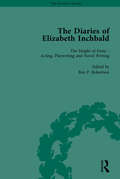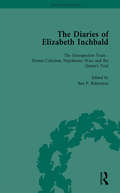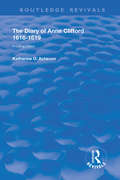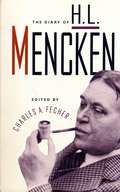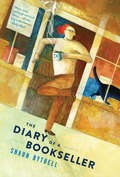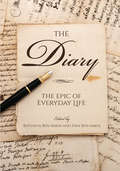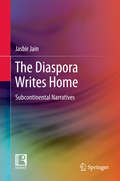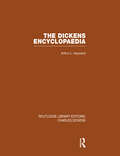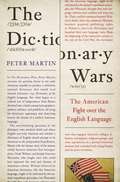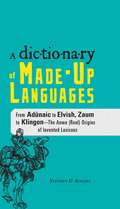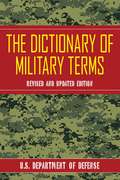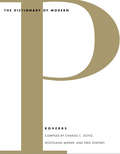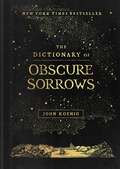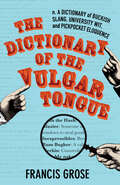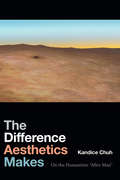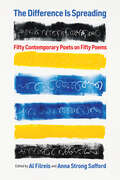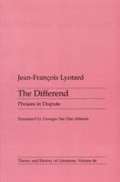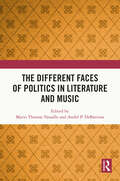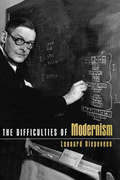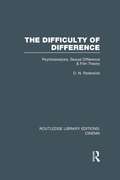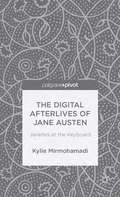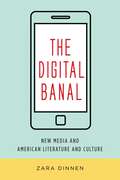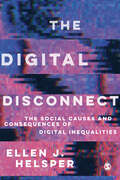- Table View
- List View
The Diaries of Elizabeth Inchbald Vol 2
by Ben P RobertsonAn energetic woman, Inchbald achieved fame as an actress, novelist, playwright and critic. This work includes her eleven surviving diaries, which record Inchbald's social contacts and professional activities, itemize her day-to-day expenditure, and chart the development of affairs such as the Napoleonic Wars and the trial of Queen Caroline.
The Diaries of Elizabeth Inchbald Vol 3: Electronic Edition (The\pickering Masters Ser.)
by Ben P RobertsonAn energetic woman, Inchbald achieved fame as an actress, novelist, playwright and critic. This work includes her eleven surviving diaries, which record Inchbald's social contacts and professional activities, itemize her day-to-day expenditure, and chart the development of affairs such as the Napoleonic Wars and the trial of Queen Caroline.
The Diary of Anne Clifford 1616-1619: A Critical Edition (Routledge Revivals)
by Katherine O. AchesonOriginally published in 1995, this book contains a full version of The Diary of Anne Clifford, alongisde an introduction and textual notes. Anne Clifford left one of the most extensive autobiographical records of the seventeenth century and, it was first published, this edition was the first critical edition of any of her works.
The Diary of H. L. Mencken
by Charles A. FecherA Historical Treasure: the never-before, published diary of the most outspoken, iconoclastic, ferociously articulate of American social critics -- the sui generis newspaperman, columnist for the Baltimore Sun, editor of The American Mercury, and author of The American Language, who was admired, feared, and famous for his merciless puncturing of smugness, his genius for deflating pomposity and pretense, his polemical brilliance. Walter Lippmann called him, in 1926, "the most powerful personal influence on this whole generation of educated Americans." H. L. Mencken's diary was, at his own request, kept sealed in the vaults of Baltimore's Enoch Pratt Library for a quarter of a century after his death. The diary covers the years 1930 -- 1948, and provides a vivid, unvarnished, sometimes shocking picture of Mencken himself, his world, and his friends and antagonists, from Theodore Dreiser, F. Scott Fitzgerald, Sinclair Lewis, and William Faulkner to Franklin D. Roosevelt, for whom Mencken nourished a hatred that resulted in spectacular and celebrated feats of invective. From the more than 2,000 pages of typescript that have now come to light, the Mencken scholar Charles A. Fecher has made a generous selection of entries carefully chosen to preserve the whole range, color, and impact of the diary. Here, full scale, is Mencken the unique observer and disturber of American society. And here too is Mencken the human being of wildly contradictory impulses: the skeptic who was prey to small superstitions, the dare-all warrior who was a hopeless hypochondriac, the loving husband and generous friend who was, alas, a bigot. Mencken emerges from these pages unretouched -- in all the often outrageous gadfly vitality that made him, at his brilliant best, so important to the intellectual fabric of American life.
The Diary of Lady Murasaki
by Murasaki Shikibu Richard BowringFrom the book: Murasaki Shikidu was born in Japan c. 973, during the Heian period (794-1192), when the head of the major faction of the Fujiwara clan, Michinaga, held sway over the imperial court. Her father was a minor official, who never became more than a provincial governor, and whose chief claim to fame must be his role in the education of his remarkable daughter. Apart from what she reveals in her diary, we know little of her life. She married around the turn of the century, had one daughter and was widowed soon after. During the next four or five years Murasaki seems to have begun writing The Tale of Genji, the work of fiction that was to bring her fame. It is probable that chapters were read at court and came to the notice of Michinaga, who decided that she would be an excellent addition to the entourage of his daughter, Shoshi (or sAkiko), the young emperors first consort. She entered the service of Shoshi in 1006. Her diary describes the details of court life, the birth of a prince, and contains some tart observations on her contemporaries, but the record as we have it today does not go beyond 1010. Lady Murasaki is best known as the author of the Genji, a long prose narrative of astonishing complexity and sophistication, which is today recognized as one of the masterpieces of Japanese literature. It is not known exactly how long she lived, but she probably died at some time between 1014 and 1025. Richard Bowring was educated at Downing College, Cambridge, from where he gained his PhD in 1973. He subsequently taught at Monash, Columbia and Princeton, returning to Cambridge in 1985. He is now Professor of Japanese Studies and Master of Selwyn College. He has written a number of books including Mori Ogai and the Modernization of Japanese Culture (1979) and An Introduction to Modem Japanese (2 volumes; 1992), and he was co-editor of The Cambridge Encyclopedia of Japan (1993). His primary research is now in the field of Japanese religions.
The Diary of a Bookseller
by Shaun BythellHilarious, wry, and charming tales of bookselling in remotest Scotland "Among the most irascible and amusing bookseller memoirs I've read." --Dwight Garner, New York TimesThe funny and fascinating memoir of Bythell's experiences at the helm of The Bookshop, Scotland's largest second hand bookstore--and the delightfully unusual staff members, eccentric customers, odd townsfolk and surreal buying trips that make up his life there.
The Diary: The Epic of Everyday Life
by Dan Ben-Amos Batsheva Ben-AmosThe diary as a genre is found in all literate societies, and these autobiographical accounts are written by persons of all ranks and positions. The Diary offers an exploration of the form in its social, historical, and cultural-literary contexts with its own distinctive features, poetics, and rhetoric. The contributors to this volume examine theories and interpretations relating to writing and studying diaries; the formation of diary canons in the United Kingdom, France, United States, and Brazil; and the ways in which handwritten diaries are transformed through processes of publication and digitization. The authors also explore different diary formats, including the travel diary, the private diary, conflict diaries written during periods of crisis, and the diaries of the digital era, such as blogs. The Diary offers a comprehensive overview of the genre, synthesizing decades of interdisciplinary study to enrich our understanding of, research about, and engagement with the diary as literary form and historical documentation.
The Diaspora Writes Home
by Jasbir JainThe Diaspora Writes Home looks at the multiple dispersions of the emigrants from South Asia across time and space, to the various homelands they relate to now. The word 'write' is used in all its creative expression: as an inscription, a mark of connectivity, a remembrance, and an involvement with memory with all its shifts. Writing is also a representation and carries its own baggage of poetics and aesthetics, categories which can be problematic vis-a-vis the writer and his/her emotional location. The book explores the many ways the diaspora remembers and reflects upon the lost homeland and its own relationship with an ancestral past, its history, culture, and the current political conflicts. Among the questions the book asks is: How does the diaspora relate to us at home and what is our relationship to migrants as representatives of our present? The last is problematic in itself for our present is not theirs and distance cannot equate the two. The transformations that new locations have brought about as they have traveled through time and interacted with the politics of their new homelands have altered their affiliations and perspectives. An important aspect of political emigrations is the refugee/muhajir, especially in the South Asia subcontinent. [Subject: Literary Criticism, Asian Studies, Migration Studies]
The Dickens Encyclopaedia: Routledge Library Editions: Charles Dickens Volume 8 (Routledge Library Editions: Charles Dickens #Vol. 8)
by Arthur L. HaywardThis is the standard reference guide to the works of Charles Dickens. The material is arranged alphabetically, in dictionary style, and provides a quick means of reference to the plots of the novels and to all the characters and places mentioned in the novels. There are also useful explanatory notes on allusions and phrases.
The Dictionary Wars: The American Fight over the English Language
by Peter MartinA compelling history of the national conflicts that resulted from efforts to produce the first definitive American dictionary of English <P><P>In The Dictionary Wars, Peter Martin recounts the patriotic fervor in the early American republic to produce a definitive national dictionary that would rival Samuel Johnson’s 1755 Dictionary of the English Language. <P><P>But what began as a cultural war of independence from Britain devolved into a battle among lexicographers, authors, scholars, and publishers, all vying for dictionary supremacy and shattering forever the dream of a unified American language. <P><P>The overwhelming questions in the dictionary wars involved which and whose English was truly American and whether a dictionary of English should attempt to be American at all, independent from Britain. Martin tells the human story of the intense rivalry between America’s first lexicographers, Noah Webster and Joseph Emerson Worcester, who fought over who could best represent the soul and identity of American culture. <P><P>Webster believed an American dictionary, like the American language, ought to be informed by the nation’s republican principles, but Worcester thought that such language reforms were reckless and went too far. Their conflict continued beyond Webster’s death, when the ambitious Merriam brothers acquired publishing rights to Webster’s American Dictionary and launched their own language wars. <P><P>From the beginning of the nineteenth century to the end of the Civil War, the dictionary wars also engaged America’s colleges, libraries, newspapers, religious groups, and state legislatures at a pivotal historical moment that coincided with rising literacy and the print revolution. <P><P>Delving into the personal stories and national debates that arose from the conflicts surrounding America’s first dictionaries, The Dictionary Wars examines the linguistic struggles that underpinned the founding and growth of a nation.
The Dictionary of Made-Up Languages: From Elvish to Klingon, The Anwa, Reella, Ealray, Yeht (Real) Origins of Invented Lexicons
by Stephen D RogersCan you converse in Klingon? Ask an Elf the time of day? Greet a speaker of Esperanto? These are among the more than 100 constructed languages you'll find in this book. For each one, author Stephen D. Rogers provides vocabulary, grammatical features, background information on the language and its inventor, and fascinating facts. What's more, easy-to-follow guidelines show you how to construct your own made-up language--everything from building vocabulary to making up a grammar.So pick up this dictionary! In no time, you'll be telling your friends, "Tsun oe nga-hu ni-Na'vi pangkxo a fì-'u oe-ru prrte' lu." ("It's a pleasure to be able to chat with you in Navi.")
The Dictionary of Military Terms
by DefenseThis is the comprehensive, standardized dictionary of military and associated terminology compiled and used by the Department of Defense. Divided into two sections, The Dictionary of Military Terms contains the terms and definitions approved for Department of Defense (DOD) and the North Atlantic Treaty Organization (NATO) use as well as a complete listing of commonly used abbreviations and acronyms. These military and associated terms, together with their definitions, constitute approved terminology for general use by all DOD components.The Dictionary of Military Terms supplements standard English-language dictionaries and standardizes military and associated terminology to improve communication and mutual understanding within the DOD, with other federal agencies, and among the United States and its allies. It is the primary terminology source when preparing correspondence, including policy, strategy, doctrine, and planning documents. This publication applies to the Office of the Secretary of Defense, the Services, the Joint Staff, combatant commands, DOD agencies, and all other DOD components, and covers terms such as:active defensebattle damage assessmentcandidate target listdirected energyevent matrixfootprinthub and spoke distributionmobilizationnonconventional assisted recoveryprotectionretained personnelspecial operationssurvival, evasion, resistance, and escapeweapons readiness stateand more!
The Dictionary of Modern Proverbs
by Wolfgang Mieder Fred R. Shapiro Charles Clay Doyle"You can't unring a bell. " "It takes a village to raise a child. " "Life is just a bowl of cherries. " We sometimes think of proverbs as expressions of ancient wisdom, but in fact new proverbs are constantly arising. This unique volume is devoted exclusively to English-language proverbs that originated in the twentieth and twenty-first centuries. The most complete and accurate such collection ever compiled,The Dictionary of Modern Proverbspresents more than 1,400 individual proverbs gathered and researched with the help of electronic full-text databases not previously used for such a project. Entries are organized alphabetically by key words, with information about the earliest datable appearance, origin, history, and meaning of each proverb. Mundane or sublime, serious or jocular, these memorable sayings represent virtually every aspect of the modern experience. Readers will find the book almost impossible to put down once opened; every page offers further proof of the immense vitality of proverbs and their colorful contributions to the oral traditions of today.
The Dictionary of Obscure Sorrows
by John KoenigA truly original book in every sense of the word, The Dictionary of Obscure Sorrows poetically defines emotions that we all feel but don&’t have the words to express, until now—from the creator of the popular online project of the same name.Have you ever wondered about the lives of each person you pass on the street, realizing that everyone is the main character in their own story, each living a life as vivid and complex as your own? That feeling has a name: &“sonder.&” Or maybe you&’ve watched a thunderstorm roll in and felt a primal hunger for disaster, hoping it would shake up your life. That&’s called &“lachesism.&” Or you were looking through old photos and felt a pang of nostalgia for a time you&’ve never actually experienced. That&’s &“anemoia.&” If you&’ve never heard of these terms before, that&’s because they didn&’t exist until John Koenig began his epic quest to fill the gaps in the language of emotion. Born as a website in 2009, The Dictionary of Obscure Sorrows has garnered widespread critical acclaim, inspired TED talks, album titles, cocktails, and even tattoos. The Dictionary of Obscure Sorrows &“creates beautiful new words that we need but do not yet have,&” says John Green, bestselling author of The Fault in Our Stars. By turns poignant, funny, and mind-bending, the definitions include whimsical etymologies drawn from languages around the world, interspersed with otherworldly collages and lyrical essays that explore forgotten corners of the human condition—from &“astrophe,&” the longing to explore beyond the planet Earth, to &“zenosyne,&” the sense that time keeps getting faster. The Dictionary of Obscure Sorrows is for anyone who enjoys a shift in perspective, pondering the ineffable feelings that make up our lives, which have far more in common than we think. With a gorgeous package and beautifully illustrated throughout, this is the perfect gift for creatives, word nerds, and people everywhere.
The Dictionary of the Vulgar Tongue: A Dictionary of Buckish Slang, University Wit, and Pickpocket Eloquence (Hesperus Classics)
by Francis GroseDo you know your abbess from your elbowshaker? Originally printed as a guide to street slang for men of quality, this reference guide will enrich your vocabulary with vulgar witticisms fashionable more than 200 years ago.The avowed purpose of this dictionary was to give men "of fashion" an insight into the inappropriate language of the street. Read in modern times it is by turn uproariously funny and deeply confusing and yet certain truths have remained—the need for the mot juste has not diminished. Many of the words should be brought back into common parlance forthwith: we have no term for the "admiral of the narrow seas," one who from drunkenness vomits into the lap of the person sitting opposite to him. We have perhaps less use for a word for "dobin rig" or "Stealing ribbons from haberdashers early in the morning or late at night; generally practised by women in the disguise of maid servants." Learn how the Georgians and early Victorians would insult each other and find out how some of today's words and derivations have come about in this quirky little volume.
The Didactic Muse: Scenes of Instruction in Contemporary American Poetry
by Willard SpiegelmanFrom Horace to Robert Frost ("a poem begins in delight and ends in wisdom") the major current of Western poetics has flowed from the wells of pleasure to the depths of instruction. That poetry serves pedagogy seemed as unarguable in the classical and early modern worlds as it may appear untenable in the contemporary one. Poets traditionally held their mirrors up to nature not simply to reflect it but to occasion reflection and right action in their readers.
The Difference Aesthetics Makes: On the Humanities “After Man”
by Kandice ChuhIn The Difference Aesthetics Makes cultural critic Kandice Chuh asks what the humanities might be and do if organized around what she calls “illiberal humanism” instead of around the Western European tradition of liberal humanism that undergirds the humanities in their received form. Recognizing that the liberal humanities contribute to the reproduction of the subjugation that accompanies liberalism's definition of the human, Chuh argues that instead of defending the humanities, as has been widely called for in recent years, we should radically remake them. Chuh proposes that the work of artists and writers like Lan Samantha Chang, Carrie Mae Weems, Langston Hughes, Leslie Marmon Silko, Allan deSouza, Monique Truong, and others brings to bear ways of being and knowing that delegitimize liberal humanism in favor of more robust, capacious, and worldly senses of the human and the humanities. Chuh presents the aesthetics of illiberal humanism as vital to the creation of sensibilities and worlds capable of making life and lives flourish.
The Difference Is Spreading: Fifty Contemporary Poets on Fifty Poems
by Al Filreis and Anna Strong SaffordSince its inception in 2012, the hugely successful online introduction to modern poetry known as ModPo has engaged some 415,000 readers, listeners, teachers, and poets with its focus on a modern and contemporary American tradition that runs from Walt Whitman and Emily Dickinson up to some of today's freshest and most experimental written and spoken verse. In The Difference Is Spreading, ModPo's Al Filreis and Anna Strong Safford have handed the microphone over to the poets themselves, by inviting fifty of them to select and comment upon a poem by another writer.The approaches taken are various, confirming that there are as many ways for a poet to write about someone else's poem as there are poet-poem matches in this volume. Yet a straight-through reading of the fifty poems anthologized here, along with the fifty responses to them, emphatically demonstrates the importance to poetry of community, of socioaesthetic networks and lines of connection, and of expressions of affection and honor due to one's innovative colleagues and predecessors. Through the curation of these selections, Filreis and Safford express their belief that the poems that are most challenging and most dynamic are those that are open—the writings, that is, that ask their readers to participate in making their meaning. Poetry happens when a reader and a poet come in contact with one another, when the reader, whether celebrated poet or novice, is invited to do interpretive work—for without that convergence, poetry is inert.
The Differend: Phrases in Dispute (Theory and History of Literature #46)
by Jean Francois LyotardReading Dossier; Title; Object; Thesis; Question; Problem; Stakes; Context; Pretext; Mode; Genre; Style; Reader; Author; Address.
The Different Faces of Politics in Literature and Music
by Mario Thomas Vassallo André P. DeBattistaThis book highlights the links between politics and governance and the arts. The essays in the volume show how literature and music have challenged those in power risking political censure. In addition, they also try to delineate how patronage has been used for propaganda, or to stir up national fervour. They focus on the tension and symbiosis between the politician and the artist foregrounding how they have always tried to influence, challenge, and, in some cases, undermine one another. This volume will serve as an indispensable source for researchers and academics in political science, the humanities and performing arts.
The Difficulties of Modernism
by Leonard DiepeveenFirst published in 2003. Routledge is an imprint of Taylor & Francis, an informa company.
The Difficulty of Difference: Psychoanalysis, Sexual Difference and Film Theory (Routledge Library Editions: Cinema)
by D. N. RodowickThis book argues that serious misreadings of Freud and Lacan on sexual difference have characterized prevailing models of psychoanalytic film criticism. In critiquing theories of identification and female spectatorship, the author maintains that early film theorists and feminist critics are equally guilty of imposing a binary conception of sexual difference on Freud’s thought. By embracing such a rigid definition of male/female difference, they fail to understand the fundamentally complex and fluid process of sexual identification as it is articulated in Freud’s writing, constructed in film texts, and negotiated by spectators. The book turns to Freud’s work on fantasy to develop an alternative model for interpreting sexuality in the visual and narrative arts, one that emphasizes a ‘politics of critical reading’ over accepted theories of ideological identification. Originally published in 1991, its strategic focus on psychoanalysis itself as an object of historical and critical inquiry, and not simply as a reading method is the unique quality of this book.
The Digital Afterlives of Jane Austen: Janeites at the Keyboard
by Kylie MirmohamadiThis is the first scholarly study to explore the ever-expanding world of online Austen fandom and fan fiction writing. Using case studies from the Internet writing community and publisher, Wattpad, as well as dedicated fan websites, it illuminates the literary processes and products that have given Austen multiple afterlives in the digital arena.
The Digital Banal: New Media and American Literature and Culture (Literature Now)
by Zara DinnenContemporary culture is haunted by its media. Yet in their ubiquity, digital media have become increasingly banal, making it harder for us to register their novelty or the scope of the social changes they have wrought. What do we learn about our media environment when we look closely at the ways novelists and filmmakers narrate and depict banal use of everyday technologies? How do we encounter our own media use in scenes of waiting for e-mail, watching eBay bids, programming as work, and worrying about numbers of social media likes, friends, and followers?Zara Dinnen analyzes a range of prominent contemporary novels, films, and artworks to contend that we live in the condition of the “digital banal,” not noticing the affective and political novelty of our relationship to digital media. Authors like Jennifer Egan, Dave Eggers, Sheila Heti, Jonathan Lethem, Gary Shteyngart, Colson Whitehead, Mark Amerika, Ellen Ullman, and Danica Novgorodoff and films such as The Social Network and Catfish critique and reveal the ways in which digital labor isolates the individual; how the work of programming has become an operation of power; and the continuation of the “Californian ideology,” which has folded the radical into the rote and the imaginary into the mundane. The works of these writers and artists, Dinnen argues, also offer ways of resisting the more troubling aspects of the effects of new technologies, as well as timely methods for seeing the digital banal as a politics of suppression. Bridging the gap between literary studies and media studies, The Digital Banal recovers the shrouded disturbances that can help us recognize and antagonize our media environment.
The Digital Disconnect: The Social Causes and Consequences of Digital Inequalities
by Ellen HelsperWith the increased digitisation of society comes an increased concern about who is left behind. From societal causes to the impact of everyday actions, The Digital Disconnect explores the relationship between digital and social inequalities, and the lived consequences of digitisation. Ellen Helsper goes beyond questions of digital divides and who is connected. She asks why and how social and digital inequalities are linked and shows the tangible outcomes of socio-digital inequalities in everyday lives. The book: Introduces the key theories and concepts needed to understand both ‘traditional’ and digital inequalities research. Investigates a range of socio-digital inequalities, from digital access and skills, to civic participation, social engagement, and everyday content creation and consumption. Brings research to life with a range of qualitative vignettes, drawing out the personal experiences that lay at the heart of global socio-digital inequalities. The Digital Disconnect is an expert exploration of contemporary theory, research and practice in socio-digital inequalities. It is also an urgent and impassioned call to broaden horizons, expand theoretical and methodological toolkits, and work collectively to help achieve a fairer digital future for all. Ellen J. Helsper is Professor of Digital Inequalities at the Department of Media and Communications at London School of Economics and Political Science.
